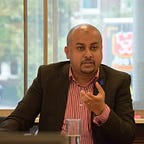Keeping the Dream Alive
Last year, I wrote about needing to dare to dream in remembrance of Martin Luther King (MLK) in the midst of isolationism and racism. Reading back on that piece, I am struck that this was written pre pandemic lockdown, pre George Floyd, pre Washington DC attacks. So one year on, standing as we do on an annual basis to remember and rededicate our struggle for justice, equality and equity, what would MLK make of today’s environment.
We have seen the best and worst of humanity over the last year. We have seen the inequities brought about by the COVID-19 pandemic, whether it is those who are on the front line who have been disproportionately affected and died as a result; or being impacted on a secondary basis (socio-economic / inter personal violence). The inequities and injustices that have been faced by the most marginalized, most vulnerable are there to be seen. Secondly we have seen how communities have started to help each other out and really be there as a support in the local context. With the rise of right wing nationalism, the issues of racism and xenophobia have become more widespread. The attacks in Washington DC on the 6th of January, illustrate that racism has not only become mainstreamed but that this is a clear and present danger.
So in this light, a question to ask is how would MLK be viewing this particular fragile time in global history. In the light of his ‘I have a Dream’ speech, what would he be saying now faced with the past year?
My thoughts are that he perhaps would not be saying anything different. The tragedy is that despite being made all those years ago, the ‘I have a Dream’ speech is as relevant now as it was then. The incidents of the 6th of January as a culmination of the last 4 years, highlights that the USA still has much to follow to live up to that dream. Beyond that though, there is much to reflect whether we on the whole have truly learnt from that time of history. In the wake of the numerous social injustices and inequities of the past year, there is much to reflect on and be accountable for doing or not doing. What would MLK have said and more importantly what would he have done?
My feeling is that MLK, despite the challenges to his popularity or his Instagram image, would have stood up and spoken against the injustices of racism, the disproportionate amount of minorities suffering and dying from the pandemic and the rise of right wing nationalism. He would have challenged the system to correct the faults even though he faced the risk of being condemned to an obscurity that he didn’t deserve, such as what happened during the Vietnam war or even the Poor People’s Campaign.
the globalisation of fragility
The current globalization of fragility as a result of the pandemic requires a need for a new paradigm. MLK’s invocation offers hope for a manifesto to combat injustice that calls out for a spiritual response using non violence. In the wake of economic, psychosocial stressors, there is a need to come back to non violent resistance an act of moral resistance that brings to the front the fight against poverty, humiliation and underdevelopment.
Successful non violence efforts requires great strength of character, perseverance and discipline. It is a means of awakening a sense of injustice and moral shame in the supporters of a power structure, showing them that they have more to gain by ending injustice and oppression than by maintaining them. It is about exposing the unjust means of a power structure, the isolation of actions, changing the narrative that can be used for justification.
Ultimately non violence is about communicating a moral priority. None communicated this more than MLK who despite losing his supporter base would shift attention from the civil rights movement to economic injustice and the Vietnam war in 1965, which unfortunately have been erased from the cultural narrative of his life and legacy.
MLK used this as a invoking of a sense of moral shame that would damage or diminish its prestige. In his 1963 letter from Birmingham jail in particular, MLK drew inspiration from the gospel and biblical teachings in order to justify his fight against injustice. Injustice anywhere is a threat to justice everywhere. He mentions just and unjust law and offers insight into how not only the church but other faith leaders and communities should act in the face of injustice. — to be a thermostat that transformed the mores of society and when he mentions ‘ if the church of today doesn’t recapture the sacrificial spirit of the past, it will lose its authenticity. It will forfeit the loyalty of millions and will be dismissed as an irrelevant social club with no meaning’.
This is the dream that needs to be kept alive especially during these bleak times of the lockdown. Injustice in the home (through interpersonal violence), or in the community (through socio economic burdens) is on the increase. There has to be a way to fight against this to ensure that the marginalized and vulnerable are not forgotten.
As we face the pandemic and lockdown it is easy to get disillusioned. It is easy to lose confidence and focus. We have to keep our spirits up and the need to keep on dreaming. Confidence needs to be maintained
This is the challenge that MLK sets for us today, people of faith and no faith to see where we stand during times of challenge and controversy, rising above the narrow confines of our individualistic concerns to the broader concerns of all humanity. This is why we need to keep the dream alive to ensure the MLK’s vision is not confined to the annals of a whitewashed history.
